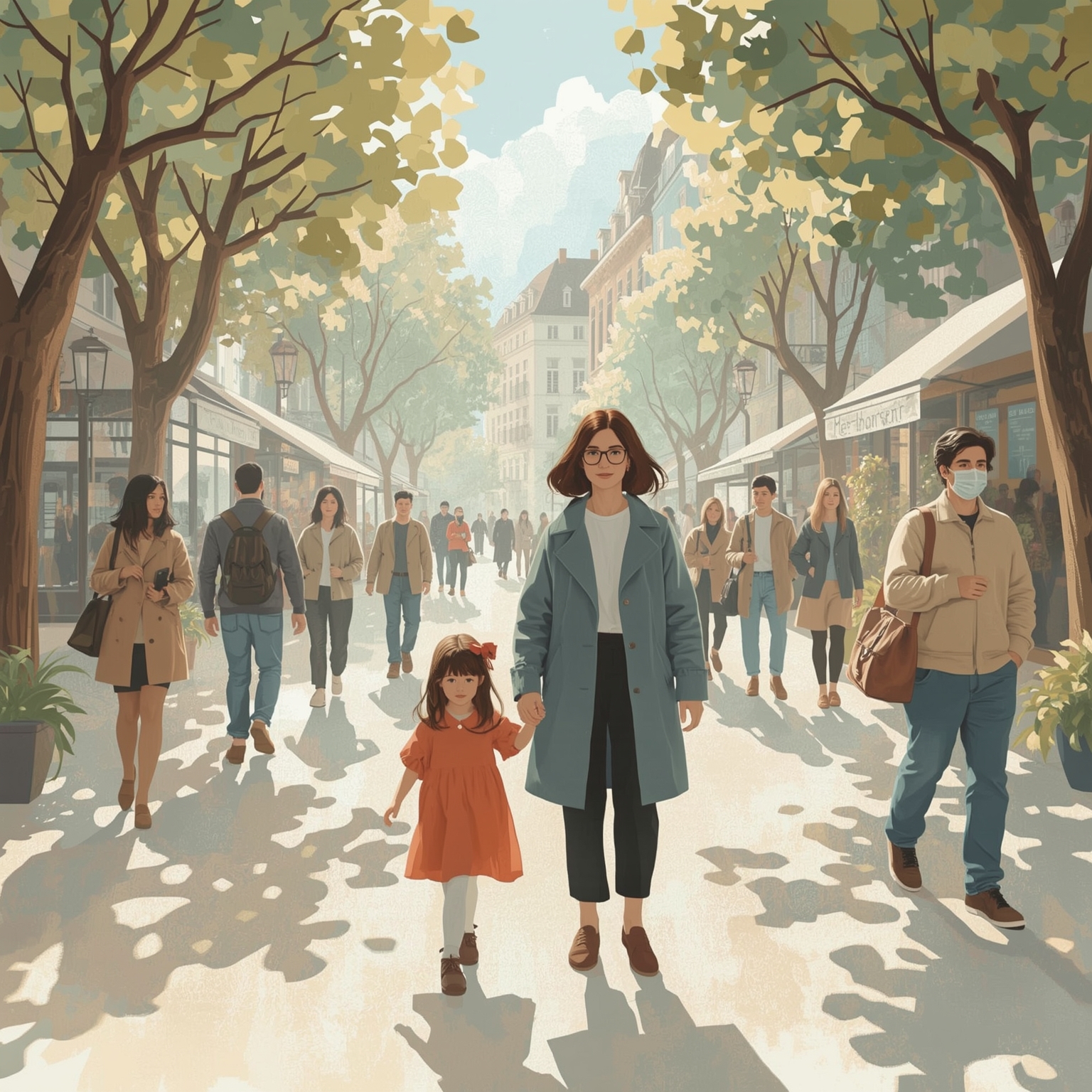This first-person narrative is drawn from extensive, reflective conversations with Candice Smith, a 47‑year‑old mother who, after decades in Florida, decided to radically reshape her life. She relocated with her daughter to Europe, and together they have made homes in Italy, Turkey, and Spain. The story presented here has been carefully condensed and refined to maintain clarity and focus.
For many years, Smith built a steady and comfortable existence in Florida. She maintained what most would call a typical life: she ran a salon business, managed the rhythms of daily domesticity, and dedicated herself wholly to homeschooling her daughter, who lives with both cerebral palsy and autism. Her days followed a predictable rotation — opening her salon each morning, tending to clients, returning home to handle chores, preparing meals, and finally collapsing in front of Netflix before drifting to sleep. It was a life that, while stable and outwardly fulfilling, lacked one crucial ingredient she increasingly longed for — a genuine, soul-deep sense of human connection.
After enduring a painful and emotionally taxing divorce, Smith began reevaluating every corner of her life. She longed not merely for distraction but for transformation, and to that end, decided that travel might serve as both remedy and revelation. In 2015, she embarked on her very first transatlantic flight bound for Paris — a journey that would ultimately alter the trajectory of her life in ways she could not have imagined.
Each subsequent trip across the Atlantic unveiled new layers of human warmth and possibility. In Europe, she encountered an openness and sociability that had felt missing from her American routine. Strangers became friends; conversations bloomed naturally in cafés and public squares. She also began to notice a surge in romantic prospects — a renewed affirmation that life still held excitement and connection.
Then, in 2018, a defining moment arrived. While sitting at a charming café in Rome with a close friend, surrounded by the chatter of locals and the scent of roasted espresso beans, Smith experienced an undeniable sense of belonging. Turning to her friend, she announced impulsively yet with absolute conviction, “I’m moving here.” Her companion, incredulous, asked whether she was serious. Smith’s reply was immediate and unwavering: “I’ve never felt a need to be anywhere as powerfully as I feel it now.”
Within a mere two months, her intuition had materialized into action. She obtained her *codice fiscale* — Italy’s equivalent of a social security or tax identification number — secured an apartment, handed the management of her Florida salon to her sister, and informed family members of her impending relocation. Packing up her daughter, their two dogs, and the essentials of their life, she left behind the familiar comfort of Florida’s subtropical coastline and resettled in Rome before summer’s end. That decisive move marked the beginning of a continuous journey of living abroad, a path she has followed ever since with steadfast determination and no inclination to return permanently to her old life.
### Language Learning as a Foundation for Integration
Since establishing herself overseas, Smith has lived in three culturally distinct countries: Italy, Turkey, and Spain. Each transition brought along fresh experiences of personal growth, logistical challenges, and moments of cultural discovery. She came to understand that building a real life abroad requires more than picturesque scenery — it demands adaptability, patience, and, above all, communication.
She quickly discovered that one of the greatest challenges of expatriate life lies in understanding local systems — everything from healthcare bureaucracy to everyday shopping habits — as well as decoding subtle social norms. Forming friendships and finding trustworthy allies, especially in the context of raising a child with special needs, proved both essential and at times daunting.
For Smith, acquiring the local language became the cornerstone of feeling truly at home. Although some expatriates manage to live for years without becoming fluent, she found that approach unimaginable. To her, language serves not just as a tool for transactions but as a bridge to empathy, belonging, and authentic human connection. When she relocated to Turkey, for instance, she immersed herself wholeheartedly in learning Turkish. Because English was less commonly spoken there, even basic errands or hospital appointments demanded at least a foundational understanding of the language.
Her diligence proved invaluable in 2022 during one of the most painful chapters of her life: losing her mother to COVID while she was visiting Istanbul. In that moment of profound grief, Smith confronted the limits of technology and translation apps. When crisis struck, her modest Turkish vocabulary could only carry her so far, but the generosity of her Turkish friends filled the gap. They arrived at the hospital and reassured her, saying tenderly, “Candice, don’t worry — we will treat this as if it were our own mother.” Their compassion was a lifeline, and their words offered immeasurable comfort during those dark hours, reminding her that language—and friendship—can transcend nationality.
### Accessibility and Disability Awareness Across Borders
Through years of moving between different cultures, Smith also came to realize that inclusivity for people with disabilities varies profoundly from country to country. While she believes that beauty and opportunity exist everywhere, she and her daughter have experienced firsthand that some societies are more accommodating than others.
In Rome, for example, historical charm was often accompanied by logistical obstacles. The city’s ancient infrastructure rarely harmonized with modern accessibility standards: elevator outages in metro stations were common, and there were days when Smith had to physically carry her daughter down long escalators just to reach a train platform. Yet daily living in Rome also held tremendous positives — chief among them a palpable sense of safety and community.
In Florida, allowing her daughter out alone would have felt unthinkable. But in their Roman neighborhood — a lively area with a population size comparable to Chicago — Smith felt no hesitation in granting her daughter small doses of independence. The community’s deeply ingrained neighborly spirit fostered a sense of mutual care and collective responsibility. Neighbors looked out for one another; people greeted them warmly on the street. As a result, her daughter flourished, savoring an autonomy that might have been impossible elsewhere.
### Education, Growth, and Adaptability
Although her daughter has now completed high school, learning continues to be a dynamic, lifelong pursuit. Smith integrates a form of “world schooling,” blending traditional online courses with real-world experiences. Her daughter is currently studying subjects such as financial literacy, Spanish, and Japanese — an ambitious combination reflecting both practical and cultural curiosity. To supplement formal lessons, they frequently embark on experiential adventures, such as taking international cooking classes. Through these explorations, Smith ensures her daughter not only absorbs academic knowledge but also learns empathy, adaptability, and confidence through real interactions with people from diverse backgrounds. She considers her daughter’s ability to thrive regardless of location one of the greatest testaments to human resilience she has ever witnessed.
### A New Life in Spain and a Broader Philosophy
At present, Smith and her daughter reside in Málaga, a luminous coastal city in southern Spain known for its Mediterranean charm and welcoming atmosphere. With a population exceeding half a million, Málaga manages to balance vibrancy with tranquility — large enough to offer everything one might need, yet sufficiently spread out to avoid overcrowding. The city’s infrastructure, cleanliness, and thoughtful urban planning have also made daily life far easier for those navigating disability.
The pair found what Smith describes as an ideal home: a spacious two‑bedroom, two‑bathroom apartment in one of Málaga’s most desirable neighborhoods. It features communal amenities such as tennis courts and a swimming pool, and lies only a short ten‑minute walk from the beach. Perhaps most astonishingly, they pay just €1,350 per month — a modest sum by the standards of many major Western cities — making their Mediterranean lifestyle both comfortable and sustainable.
Following the global upheavals brought on by the COVID‑19 pandemic, Smith made another pivotal decision: to close her Florida salon permanently and embrace the independence of entrepreneurial and remote work. She co‑founded *Her Expat Life*, a company dedicated to curating specialized events and resources for women living, working, or exploring abroad. Through this initiative, she supports others navigating the complexities of expatriate existence, offering camaraderie, mentorship, and community to women seeking belonging across borders.
In reflecting on her years overseas, Smith describes the most profound reward as the feeling of being a true global citizen — a person for whom the world itself has become home. She treasures the knowledge that she can arrive almost anywhere on earth and find connection, whether through old friends or through friends-of-friends who extend kindness and welcome. That sense of global interlinkedness, she says, is the most enriching experience imaginable.
Ultimately, her journey has distilled several deeply held convictions about motherhood and society. She has observed that raising a child feels significantly more manageable in countries that place genuine value on family life. In Spain, where social systems are designed to support both parents and children, she feels free from the guilt that once plagued her when prioritizing her daughter’s needs over professional obligations. Whether she must decline a business call or pause work to attend to her daughter, the surrounding culture reinforces rather than penalizes her maternal priorities. In such an environment, emotional balance is attainable, and that, Smith insists, makes all the difference between merely surviving parenthood and truly savoring it.
Sourse: https://www.businessinsider.com/single-mom-moves-florida-to-europe-autistic-daughter-2025-11



